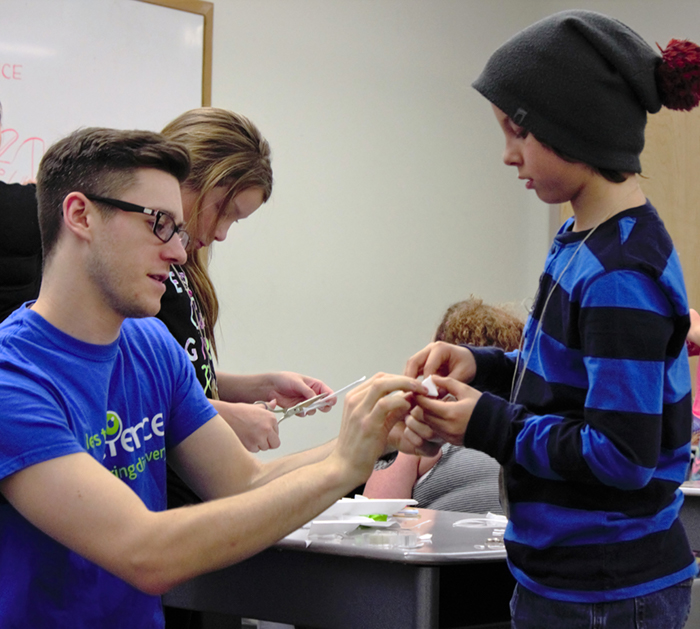Inspiring the next generation of researchers
By Curtis McCloskey, Ph.D Candidate, Vanier Scholar
It takes far less than 6 degrees of separation to find someone who has been affected by cancer. Humanity has been waging a war on this dark menace for centuries and I believe we are finally at a point where we will see a rapid and robust increase in the new treatments available thanks to the advent of cancer biotherapeutics. I’ve always found the immune system particularly interesting, maybe it was watching The Magic School Bus or Bill Nye the Science guy or due to the many great science teachers I’ve had. Now four years into my Ph.D, or grade 21 as I usually joke, I’m studying in the lab of Dr. Barbara Vanderhyden at the Ottawa Hospital Research Institute. Our research focuses on developing new therapies to treat ovarian cancers which are the most deadly gynecological cancers in the Western world, a statistic that has been unchanged for decades. Ovarian cancers are thought to be ‘immunogenic’ cancers, in other words, cancers that have great potential in responding to biotherapies. Our lab has set its sights on multiple types of cancer biotherapies including oncolytic viruses, cancer vaccines, and antibody therapies that we are keenly testing in our pre-clinical animal models of ovarian cancers.

for youth.
As cancer researchers, it’s not only our duty to develop new cancer treatments, but also to ditch the white coat, and engage in science outreach in schools, community centers, and public venues spreading knowledge and inspiring youth to join us in our evolving quest to defeat cancer. Throughout my Ph.D, I have been lucky enough to engage with youth across Canada delivering cancer and career workshops to over 3000 students through a national volunteer program called Let’s Talk Science. Last year with the help of BioCanRx, our team developed a new workshop that teaches the field of cancer biotherapeutics to Grade 10-12 high school students. Our cancer biotherapeutics workshop is a fun hands-on teamwork activity that gets students to determine the differences between cancer and non-cancerous cells in order to exploit these differences to develop new cancer biotherapies. So far, this workshop has been delivered to more than 500 students across Canada including 200km above the Arctic Circle, in Inuvik, Northwest Territories! I was fortunate enough to visit Inuvik twice over the past two years where during a one week period, we visit every classroom in the city delivering workshops from pre-school to grade 12 covering topics such as aerodynamics, heart health, ocean floor mapping, and of course, cancer. One of my favorite classes was a class where students learned and applied indigenous knowledge on how to live on the land. I gave a cancer seminar and focused it on how many of the biotechnologies we use in the laboratory came from studying nature. For example, we have harnessed the genes responsible for the glow of fireflies to make our oncolytic viruses glow in order to track them in our pre-clinical experiments.
I am a big advocate for equal access to education across Canada, and with that comes access to fun programs like Let’s Talk Science that promotes STEM learning. My volunteering has taken me to 4 indigenous communities, including Ojibwe communities in Northern Ontario, and Inuvialuit and Gwich’in communities in the Northwest Territories. Indigenous communities face vastly higher cancer rates than the rest of the Canadian population and I believe it is extremely important to disseminate cancer knowledge to all of the youth in this land beyond big city centers. Now, thanks to Let’s Talk Science and BioCanRx, we have begun delivering our cancer workshop in many rural and indigenous communities across Canada. I have great hopes that our research and science outreach is planting seeds of inspiration in the next generation of cancer scientists from every corner of Canada!